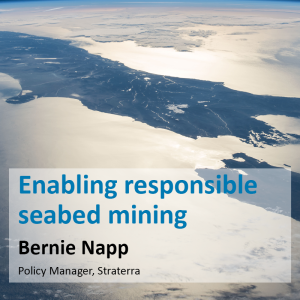Each day during the month of April, the Institute will feature one of the 30 ‘perspectives’ from the One Ocean report. These short articles include a diverse range of views regarding oceans management in New Zealand. Enjoy!
Today:
Bernie Napp, Policy Manager, Straterra
Enabling responsible seabed mining
Seabed mining has become controversial, with the Trans-Tasman Resources iron sands and Chatham Rock Phosphate projects’ marine consent applications being declined by the Environmental Protection Agency. These decisions of June 2020 and February 2020 have sent a strong signal to investors that New Zealand is an unfair and unreasonable place to do business.
The issues are how the Exclusive Economic Zone and Continental Shelf (Environmental Effects) Act 2020 (EEZ Act) regime deals with uncertainty and risk concerning the likely environmental impacts of seabed mining, how much that matters in the broader context and how to apply adaptive management.
Over time, the aforementioned projects would have affected 0.5 percent of the area of the South Taranaki Bight and the Chatham Rise respectively. Each project would cost more than $500 million upfront and turn over more than $100 million a year. They would produce iron sands for steel-making and phosphorite for agricultural fertiliser – both of which are vital to modern life. The operators would adjust their operations if environmental conditions were breached (as occurs on land) using adaptive management.
The question for society is whether or not that is acceptable. We in industry think it is and that the EEZ Act regime must be changed to achieve it. We seek a pragmatic approach to assessing environmental effects, understanding and managing uncertainty and risk, setting consent conditions and providing for adaptive management.
Industry supports marine protection legislation for the EEZ to protect important biodiversity when appropriate. Areas must be identified via an informed and consultative process. Abolishing the Benthic Protection Areas is a necessary first step for good process and for fair and constructive public debate.






















![20160906 McGuinness Institute - TacklingPovertyNZ Workshop – Far North Flyer [FINAL]](/wp-content/uploads/20160906-McGuinness-Institute-TacklingPovertyNZ-Workshop-%E2%80%93-Far-North-Flyer-FINAL-1-50x50.png)